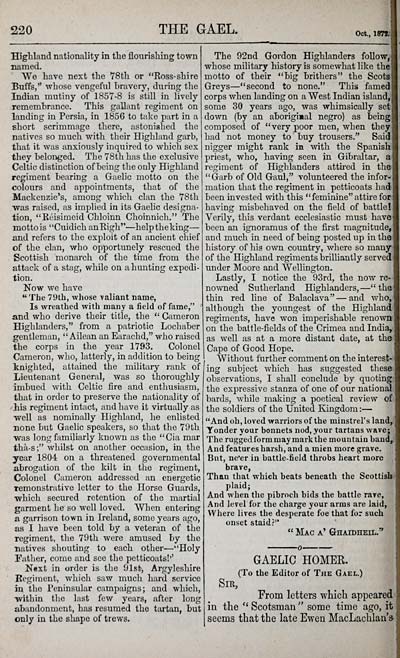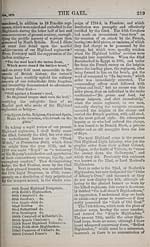Hew Morrison Collection > Gaidheal > 1 Leabh 2 Air
(198)
Download files
Complete book:
Individual page:
Thumbnail gallery: Grid view | List view

220
THE GAEL.
Oct., 187».
HigUand nationality in the flourishing town
named.
"We have next the Y8th or "Ross-shire
Buffs," Avhose vengeful bravery, during the
Indian mutiny of 1857-8 is still in lively
remcmhrance. This gallant regiment on
landing in Persia, in 1856 to take part in a
short scrimmage tliere, astonished the
natives so much with their Highland garb,
that it was anxiously inquired to which sex
they belonged. The 78th has the exclusive
Celtic distinction of being the only Highland
regiment bearing a Gaelic motto on the
colours and appointments, that of the
Mackenzie's, among which clan the 78tli
■was raised, as implied in its Gaelic designa-
tion, "Rèisimeid Chloinn Ghoinnich." The
motto is "Cuidich anRigh" — helptheking —
and refers to the exploit of an ancient chief
of the clan, who opportunely rescued the
Scottish monarch of the time from the
attack of a stag, while on a hunting expedi-
tion.
Now we have
" The 79th, whose valiant name,
Is wreathed with many a field of fame,"
and who derive their title, the " Cameron
Highlanders," from a patriotic Lochaber
gentleman, " Ailean an Earachd," who raised
the corps in the year 1793. Colonel
Cameron, who, latterly, in addition to being
knighted, attained the militaiy rank of
Lieutenant General, was so thoroughly
imbued with Celtic fire and enthusiasm,
that in order to preserve the nationality of
his regiment intact, and have it virtually as
-well as nominally Highland, he enlisted
none but Gaelic speakers, so that the 79th
was long familiarly known as the "Cia mar
thà-s;" whilst on another occasion, in the
year 1804 on a threatened governmental
abrogation of the kilt in the regiment.
Colonel Cameron addressed an energetic
remonstnitive letter to the Horse Guards,
■which secured retention of the martial
garment he so well loved. When entering
a garrison town in Ireland, some years ago,
as I have been told by a veteran of the
regiment, the 79th were amused by the
natives shouting to each other — "Holy
Father, come and sec the petticoats!''
Next in order is the 91st, Argyleshire
Begimcnt, which saw much hard service
in the Peninsular campaigns; and whicl
•within the last few years, after long
abandonment, has resumed the tartan, but
only in the shape of trews.
The 92nd Gordon Highlanders follow,
whose mihtary history is somewhat like the
motto of their "big brithers" the Scots
Greys — "second to none." This famed
corps when landing on a West Indian island,
some 30 years ago, was whimsically set
down (by an aborigi»al negro) as being
composed of "very poor men, when they
had not money to buy trousers." Said"
nigger might rank in with the Spanish
priest, who, having seen in Gibraltar, a
regiment of Highlanders attir-ed in the
"Garb of Old Gaul," volunteered the infor-
mation that the regiment in petticoats had
been invested with this "feminine" attire for
having misbehaved on the field of battle I
Verily, this verdant ecclesiastic must have
been an ignoramus of the first magnitude,
and much in need of being posted up in the
history of his own country, where so many
of the Highland regiments brilliantly served
under Moore and Wellington.
Lastly, I notice the 93rd, the now re-
nowned Sutherland Highlanders, — "the
thin red line of Balaclava" — and who,
although the youngest of the Highland
regiments, have won imperishable renown
on the battle-fields of the Crimea and India,
as well as at a more distant date, at tha
Cape of Good Hope.
Without further comment on the interest-'
ing subject which has suggested these
observations, I shall conclude by quoting
the expressive stanza of one of our national
bards, while making a poetical review of
the soldiers of the United Kingdom : —
"And oh, loved warriors of the minstrel's land.
Yonder your bonnets nod, your tartans wave;
The rugged form may mark the mountain baud.
And features harsh, and a mien more grave.
But, ne'er in battle-field throbs heart more
brave.
Than that which beats beneath the Scottish
plaid;
And when the pibroch bids the battle rave.
And level for the charge your arms are laid,
Where lives the desperate foe that for such
onset staid?"
" Mac a' Ghaidheil."
GAELIC HOMER.
(To the Editor of The Gael.)
Sir,
From letters whicli appeared
in the "Scotsman" some time ago, it
seems that the late Ewen MacLachlaii'»
THE GAEL.
Oct., 187».
HigUand nationality in the flourishing town
named.
"We have next the Y8th or "Ross-shire
Buffs," Avhose vengeful bravery, during the
Indian mutiny of 1857-8 is still in lively
remcmhrance. This gallant regiment on
landing in Persia, in 1856 to take part in a
short scrimmage tliere, astonished the
natives so much with their Highland garb,
that it was anxiously inquired to which sex
they belonged. The 78th has the exclusive
Celtic distinction of being the only Highland
regiment bearing a Gaelic motto on the
colours and appointments, that of the
Mackenzie's, among which clan the 78tli
■was raised, as implied in its Gaelic designa-
tion, "Rèisimeid Chloinn Ghoinnich." The
motto is "Cuidich anRigh" — helptheking —
and refers to the exploit of an ancient chief
of the clan, who opportunely rescued the
Scottish monarch of the time from the
attack of a stag, while on a hunting expedi-
tion.
Now we have
" The 79th, whose valiant name,
Is wreathed with many a field of fame,"
and who derive their title, the " Cameron
Highlanders," from a patriotic Lochaber
gentleman, " Ailean an Earachd," who raised
the corps in the year 1793. Colonel
Cameron, who, latterly, in addition to being
knighted, attained the militaiy rank of
Lieutenant General, was so thoroughly
imbued with Celtic fire and enthusiasm,
that in order to preserve the nationality of
his regiment intact, and have it virtually as
-well as nominally Highland, he enlisted
none but Gaelic speakers, so that the 79th
was long familiarly known as the "Cia mar
thà-s;" whilst on another occasion, in the
year 1804 on a threatened governmental
abrogation of the kilt in the regiment.
Colonel Cameron addressed an energetic
remonstnitive letter to the Horse Guards,
■which secured retention of the martial
garment he so well loved. When entering
a garrison town in Ireland, some years ago,
as I have been told by a veteran of the
regiment, the 79th were amused by the
natives shouting to each other — "Holy
Father, come and sec the petticoats!''
Next in order is the 91st, Argyleshire
Begimcnt, which saw much hard service
in the Peninsular campaigns; and whicl
•within the last few years, after long
abandonment, has resumed the tartan, but
only in the shape of trews.
The 92nd Gordon Highlanders follow,
whose mihtary history is somewhat like the
motto of their "big brithers" the Scots
Greys — "second to none." This famed
corps when landing on a West Indian island,
some 30 years ago, was whimsically set
down (by an aborigi»al negro) as being
composed of "very poor men, when they
had not money to buy trousers." Said"
nigger might rank in with the Spanish
priest, who, having seen in Gibraltar, a
regiment of Highlanders attir-ed in the
"Garb of Old Gaul," volunteered the infor-
mation that the regiment in petticoats had
been invested with this "feminine" attire for
having misbehaved on the field of battle I
Verily, this verdant ecclesiastic must have
been an ignoramus of the first magnitude,
and much in need of being posted up in the
history of his own country, where so many
of the Highland regiments brilliantly served
under Moore and Wellington.
Lastly, I notice the 93rd, the now re-
nowned Sutherland Highlanders, — "the
thin red line of Balaclava" — and who,
although the youngest of the Highland
regiments, have won imperishable renown
on the battle-fields of the Crimea and India,
as well as at a more distant date, at tha
Cape of Good Hope.
Without further comment on the interest-'
ing subject which has suggested these
observations, I shall conclude by quoting
the expressive stanza of one of our national
bards, while making a poetical review of
the soldiers of the United Kingdom : —
"And oh, loved warriors of the minstrel's land.
Yonder your bonnets nod, your tartans wave;
The rugged form may mark the mountain baud.
And features harsh, and a mien more grave.
But, ne'er in battle-field throbs heart more
brave.
Than that which beats beneath the Scottish
plaid;
And when the pibroch bids the battle rave.
And level for the charge your arms are laid,
Where lives the desperate foe that for such
onset staid?"
" Mac a' Ghaidheil."
GAELIC HOMER.
(To the Editor of The Gael.)
Sir,
From letters whicli appeared
in the "Scotsman" some time ago, it
seems that the late Ewen MacLachlaii'»
Set display mode to: Large image | Transcription
Images and transcriptions on this page, including medium image downloads, may be used under the Creative Commons Attribution 4.0 International Licence unless otherwise stated. ![]()
| Early Gaelic Book Collections > Hew Morrison Collection > Gaidheal > 1 Leabh 2 Air > (198) |
|---|
| Permanent URL | https://digital.nls.uk/76797353 |
|---|
| Attribution and copyright: |
|
|---|---|
| Description | A selection of items from a collection of 320 volumes and 30 pamphlets of literary and religious works in Scottish Gaelic. From the personal library of Hew Morrison, the first City Librarian of Edinburgh. |
|---|
| Description | Selected items from five 'Special and Named Printed Collections'. Includes books in Gaelic and other Celtic languages, works about the Gaels, their languages, literature, culture and history. |
|---|

